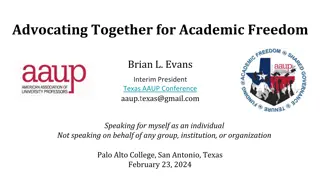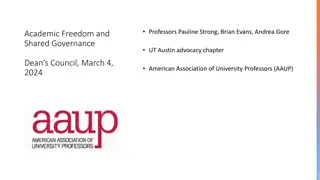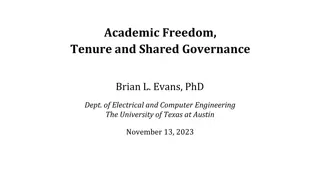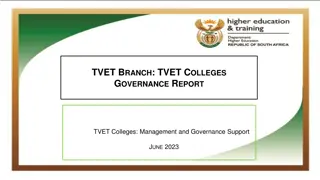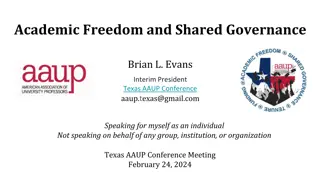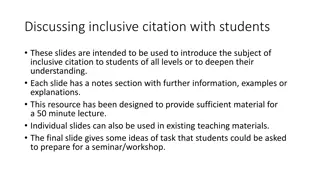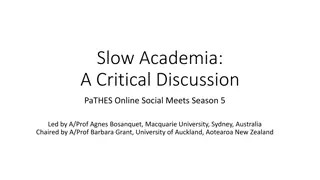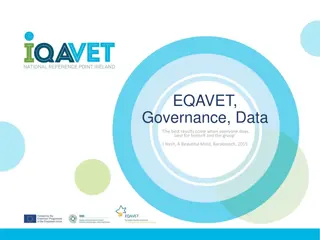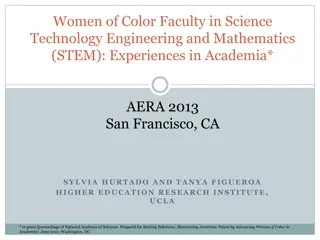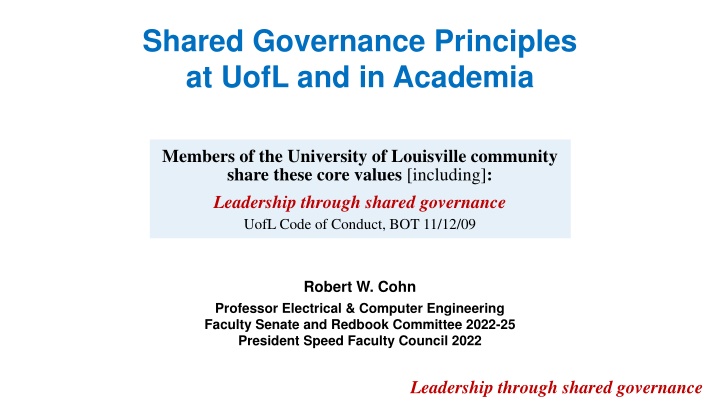
Principles of Shared Governance in Academia: UofL Overview
Explore the core values and principles of shared governance at the University of Louisville (UofL) with a focus on leadership, organizational structure, personnel policies, and more for effective decision-making and collaboration within the academic community.
Download Presentation

Please find below an Image/Link to download the presentation.
The content on the website is provided AS IS for your information and personal use only. It may not be sold, licensed, or shared on other websites without obtaining consent from the author. If you encounter any issues during the download, it is possible that the publisher has removed the file from their server.
You are allowed to download the files provided on this website for personal or commercial use, subject to the condition that they are used lawfully. All files are the property of their respective owners.
The content on the website is provided AS IS for your information and personal use only. It may not be sold, licensed, or shared on other websites without obtaining consent from the author.
E N D
Presentation Transcript
Shared Governance Principles at UofL and in Academia Members of the University of Louisville community share these core values [including]: Leadership through shared governance UofL Code of Conduct, BOT 11/12/09 Robert W. Cohn Professor Electrical & Computer Engineering Faculty Senate and Redbook Committee 2022-25 President Speed Faculty Council 2022 Leadership through shared governance
Shared Governance Principles Workshop Outline What is Shared Governance? In Academia and at UofL UofL organization according to The Redbook Principle of Jurisdiction Committees (How charges & appointments are made) Personnel Policies and Procedures (PPP) Personnel reviews (annual, promotion, tenure, 5-year) Disciplinary reviews (a type of personnel review) Faculty Recruitment (includes personnel review) Key features of Unit Bylaws and their approval Group Discussion: Applying Bylaws in practice Leadership through shared governance
Shared Governance Principles at UofL and in Academia Part I THE REDBOOK S SHARED GOVERNANCE MODEL Leadership through shared governance
What is Shared Governance? The basic principle of Shared Governance: The Group that is most intimately aware of the specifics of an issue (i.e., an issue that resides within its Jurisdiction ) is the best informed to make decisions on dealing with this issue The Administrator Normally implements the decisions of the Group Can veto group decisions, but needs to provide a clear justification to the Group Can have the veto reversed by the next-level Administrator (if the Group requests) University governance as described in The Redbook, conforms to this Shared Governance model UofL endorses Shared Governance in its Shared Governance Policy: (link to Provost webpage) For more information see the Shared Governance Reader, available from Faculty Council Website Leadership through shared governance
The Principle of Jurisdiction in Shared Governance Jurisdiction: Except as otherwise provided by The Redbook, the Faculty of the Speed School of Engineering shall have general legislative powers over its own affairs including, but not limited to, admissions requirements, curricula, instruction, examination, personnel policy and procedures, organizational structure, and recommendations through the President to the Board of Trustees for the granting of degrees. --- Speed Bylaws This jurisdictional statement is nearly identical to statement in The Redbook The Redbook defines jurisdictions for Faculty, Students and Staff Each Group is given the Leadership Role in decisions within its jurisdiction The Faculty can assign specific Decisions to Administrators, Committees, etc. These Decisions can be specified in the Bylaws or assigned on a temporary ad hoc basis The Administrator can override a Faculty Decision, but It is assumed that such decisions are infrequent, and The Administrator will clearly justify why the Faculty decision is being overridden, and The Faculty can appeal the Administrator s decision to the next level of Administration Leadership through shared governance
Shared Governance Principles for Committees In all cases not specified by these Bylaws, the Speed School Faculty and Committee Meetings shall be governed by Robert's Rules of Order (Spd IX) Robert s Rules of Order describes how to set up and run Committees* * Not all school s have adopted Robert s Rules but still informative If a Committee (e.g. ad hoc) is not specified in the Bylaws Both the charge and membership require Faculty approval The Committee Charge is always introduced and approved at a faculty meeting The Faculty may wish to assign the Chair (or other) to select Committee Members Committee appointments must be announced in a Faculty Meeting and added to the minutes before the Committee can begin its activities Non-Departmental Members of a committee require approval of the Faculty Committees normally only recommend decisions to the Faculty. They have no decision making authority (unless specified by Faculty vote or Bylaws) Leadership through shared governance
Shared Governance Principles at UofL and in Academia Part II PERSONNEL POLICIES & PROCEDURES (PPP) Leadership through shared governance
Understanding Your Units Bylaws EXAMPLE: Speed Bylaws regarding Personnel Policies and Procedures (PPP) Dean s Duties and Responsibilities regarding PPP Responsibilities, duties, and actions of the Dean shall be in keeping with the decisions, policies, and regulations adopted by and the Faculty of the Speed School. --- Article III Recommending to the Office of the University Provost the appointment, tenure, promotion, retention, sabbatical leave, annual salary increase and retirement actions of any faculty members and administrative officers of the School --- Appendix I.A.9 Administering University and School personnel policies as developed according to The Redbook procedures. --- Appendix I.B.9 Conclusion The faculty devise the Bylaws and PPP personnel policies The Dean administers personnel policies, but does not develop them Leadership through shared governance
Understanding Your Units Bylaws (continued) EXAMPLE: Speed Bylaws regarding Personnel Policies and Procedures (PPP) AP&P s Charge The Administrative Plans and Policies Committee shall serve as an advisory body to the Dean and the Faculty on administrative and academic matters. (Article VI) [AP&P functions] are to recommend to the Dean and faculty, courses of action on such matters including: Faculty Personnel Policies (Appendix III) Conclusions An AP&P vote on a personnel policy becomes a motion for a Faculty vote (since the faculty have jurisdiction on personnel policies and procedures). The Dean can always choose to veto a Faculty vote, but can only develop an alternate policy by introducing a motion for faculty vote. Leadership through shared governance
Disciplinary Reviews Nationally Recognized Policies AAUP* Principles of Academic Freedom and Tenure (1940) 1. Termination for cause considered by both faculty committee and BOT 2. Faculty member can have an advisor as counsel AAUP and AACU** Procedural Standards in Faculty Dismissal Proceedings (1958) 1. Administrative officer first seeks a resolution with the faculty member in personal conference 2. Inquiry Committee elected by the faculty recommends if there should be a Formal Hearing 3. Hearing Committee decides if there are sufficient grounds for dismissal 4. The Governing Body (BOT) accepts or rejects the recommendation of the Hearing Committee 5. Confidentiality, protecting the reputation of all, is maintained until the final decision is reached UofL and Federal Policy (CFR 42 part 93) on Research Misconduct (required of UofL by HHS) 1. All institutional members have a responsibility to report suspected research misconduct 2. Ombudsperson assesses if the allegation is sufficiently credible to be referred to Inquiry Committee 3. Inquiry Committee including individuals with the appropriate scientific expertise 4. Investigation Committee that can include members from the Inquiry Committee 5. The Deciding Officer (DO) can sanction guilty individuals based on the law and Redbook 6. Institution protects/restores reputation of the innocent. Sanctions for allegations made in bad faith Leadership through shared governance * American Association of University Professors ** American Association of Colleges & Universities (UofL is a member)
Disciplinary Reviews Nationally Recognized Policies (continued) Robert s Rules sections 61-63: Information on disciplinary hearings and disciplinary committees. Discipline related to member (i.e., Faculty) activities outside normal meetings. Allegations of misconduct (not informally resolved) require an investigation and hearing/trial either by the faculty as a whole or by a Disciplinary Committee. The committee usually recommends sanctions to the faculty body, rather than imposes sanctions. Some Universities have one faculty committee each for Inquiry Allegation Determination of Sanctions Comment:Redbook and unit documents are mute on Faculty Committee recommended sanctions. Leadership through shared governance
Disciplinary Reviews AAUParticle on Termination and Discipline (2004) AAUP policy encompasses academic due process: a statement of charges in reasonable particularity; opportunity for a hearing before a faculty hearing body; the right of counsel if desired; the right to present evidence; and opportunity to address the BOT AAUP recommends that faculty committees consider all faculty disciplinary issues. Faculty participation helps to convince courts that due process was afforded and that the institution's decision was fairly decided. The 1958 AAUP/AACU Statement has been incorporated into hundreds of faculty handbooks, it is "a necessary precondition of a strong faculty that it have first-hand concern with its own membership," including the appointment, promotion, and dismissal of their colleagues. [Also] the faculty must be willing to recommend the dismissal of a colleague when necessary. Comment:Redbook and unit documents do not guarantee faculty body reviews as part of the process. Leadership through shared governance
Disciplinary Reviews AAUParticle on Termination and Discipline (continued) Just Cause for Termination: Demonstrated incompetence or dishonesty in teaching or research, to substantial and manifest neglect of duty, and to personal conduct which substantially impairs the individual's fulfillment of his institutional responsibilities. (Similar to Redbook 4.5.3.A.1) Discipline short of Termination: each institution develop and adopt an enumeration of sanctions short of dismissal These sanctions and the due-process procedures for complaint, hearing, judgment, and appeal should be developed initially by joint faculty-administrative action. (Similar to UofL FAP, but not jointly developed.) Counter-Example/Significance: AAUP found that the UVA violated the academic due process rights of a tenured professor who had misused research funds. The Professor was afforded no opportunity to respond to each action before [the discipline] was imposed on him, and the administration did not consult with any faculty body before it acted. He was dismissed without cause demonstrated by the administration before a faculty body. The opportunity for a postdismissal hearing could not substitute for an appropriate [pre- dismissal] academic proceeding, and would have wrongly required Professor M to carry the burden of proof. (Similarly, UofL FAP places the burden of proof on the Faculty Member. Grievance Hearing, can be the only faculty hearing, only after a disciplinary decision is rendered. Grievance Hearing decision is based on misapplication of rules, not merits of personnel decision.) Leadership through shared governance
PROBLEMS WITH AND FIXES FOR THE FACULTY ACCOUNTABILITY POLICY 1. The policy does not mention faculty oversight in disciplinary matters (i.e. Faculty Jurisdiction in personnel matters. Redbook 3.3.2). It reads as if a Chair can single-handedly determine if a faculty member has violated a policy or the code of conduct. We recommend: A determination of a transgression, its severity, and means of remediation be performed in a review similar to any other faculty personnel review (as in Redbook Ch. 4). 2. For a policy this significant to be most understandable and enforceable we recommend: The policy be rewritten (per Recommendation 1) and approved for inclusion in Redbook Chapter 4. It could easily be added as new section 4.2.5 Disciplinary Investigations and Reviews. UofL Guiding Principle: All members of the UofL Community are expected to provide Leadership through shared governance Code of Conduct
PROBLEMS WITH AND FIXES FOR THE FACULTY ACCOUNTABILITY POLICY 3. The misleading title facultyaccountability policy sends the message to the public that faculty do not understand their responsibilities to conduct themselves at the highest professional standards. We recommend: The Policy be renamed Guidance to Faculty Supervisors on Progressive Disciplinary Procedures. 4. The Faculty Senate Executive Committee, UofL Administration and the Board showed a lack of understanding of the Redbook by approving a policy without obtaining faculty approval (per the legislative/jurisdictional authority of the faculty over personnel policies, criteria, and procedures, Redbook 3.3.2). Of all required training at UofL, none is more important than training in its overriding policy -- The Redbook. We recommend: UofL provides regular and repeated training on Redbook Rules and Principles to all faculty, administrators and BOT members. UofL Guiding Principle: All members of the UofL Community are expected to provide Leadership through shared governance Code of Conduct
Shared Governance Principles at UofL and in Academia Part III Key Features of Unit Bylaws and their Approval Leadership through shared governance
Recommended Language for Bylaws The Redbook requires that all Bylaws be consistent with The Redbook, School Bylaws, and UofL policies and Governing Documents, including (available as a single pdf file from FC): UofL Code of Conduct Speed Bylaws The Speed PPP document Robert s Rules of Order (current) edition (per Speed Bylaws) * Available online from UofL Library * Most, but not all Schools incorporate RRoO in their bylaws Faculty Council, with a first draft by the Dean, developed a Bylaws Template in Word that is: Modeled on the language and organization of the Speed Bylaws Consistent with the UofL and Speed Governing Documents Describes the full range of options permitted by the Governing Documents Includes notes explaining rationale and justification for the language Leadership through shared governance
Specific Requirements for Bylaws Voting Rights/Privileges Any Faculty Member with primary appointment in the Department (Spd II.A) Is a Voting Member of the Department Is also a Voting Member of Speed School Both tenure-track and term faculty* are Voting Members Faculty members with secondary appointments in the Department Cannot represent the Department on Speed-wide committees Can vote in the Department only if permitted by the Bylaws * With an initial 2 year term contract or on starting a second 1 year contract Leadership through shared governance
Specific Requirements for Bylaws Mission Statements The Departmental Faculty (per Redbook) are required to develop a Mission Statement Requires final approval by Dean It can be included in Bylaws (optional) If included in Bylaws it will require approval by a 2/3 vote The Bylaws Template provides Examples of some current UofL Mission Statements Department Mission Statement can be included in Bylaws (optional) If included in Bylaws it will require approval by a 2/3 vote The Redbook provides guidance on the content of Mission Statements See the Ch. 4 Appendix: Minimum Guidelines for Faculty Personnel Reviews, Sec. 1.C. Leadership through shared governance
Specific Requirements for Bylaws Committees The Departmental Faculty establishes the Committees that it deems necessary (Spd II.C.2) This includes both standing and ad hoc committees Add an appendix for each Standing Committee Add a policy on ad hoc committees (optional) A Departmental Faculty Affairs Committee is required (per Speed PPP Document) Committees can be added or dissolved at any time (but requires a 2/3 vote) The Bylaws Template includes Generic template for Standing Committee Charges A template for developing a policy on ad hoc committees Leadership through shared governance
Specific Requirements for Bylaws Office of the Chair/Departmental Administration Describe Office of the Chair including Appendix with the Responsibilities the Chair (See Bylaws Template for language similar to Dean s Responsibilities in Spd Appendix I) Associate Chairs or Other Administrative Roles (Optional*) Term limits (Optional See Bylaws Template for various considerations) Chair description is proscribed by The Redbook (Sec. 3.3.5) in Methods of selection/election Annual Review: Includes input from administrators and faculty Five Year Review: Led by a committee established with the concurrence of the departmental faculty * Typically, the Chair is permitted wide discretion in the preferred organization of the Office following consultation with and advice from the faculty Leadership through shared governance
The Bylaws Approval Process The Department drafts a set of Bylaws Department approves the Bylaws by a 2/3 vote of all faculty who are eligible to vote AP&P reviews and Dean reviews and approves the Bylaws Dean forwards a copy of the Bylaws to the Provost If the Dean and Department cannot reach an agreement on the Bylaws, the Provost resolves Note that Faculty Council has no specified role in the approval process, however with its overall role in representing Speed School in all matters of faculty governance , Faculty Council is available to provide advice and review at each stage of the review process described above; e.g., Review of Bylaws Drafts from the Departments Responding to questions on the Bylaws from AP&P and the Dean Helping to resolve impasses between the Dean and Department on the Bylaws Leadership through shared governance
Shared Governance Principles at UofL and in Academia Part IV Group Discussion: Case Studies Leadership through shared governance
Group Discussion: Bylaws in Practice Below are some issues that might arise in your Department or School. Consider how you might work to resolve these issues from the standpoint of a faculty member, the Chair, the Dean, the Provost. It might be useful to assign each group member to play one of these roles. Assuming there are some administrators in your group, it might be useful to reverse your roles, with a faculty member taking the role of an administrator and an administrator taking the role of a faculty member. Consider these issues in your discussion: Which group (or groups) has primary jurisdiction ? How would you propose resolving the issue? What rules and policies support your position? Are there other UofL offices and organizations that can help you resolve the issue? Issue 1: The Dean announces that there is a new faculty line and that the preferred candidate can have a primary appointment in either of two departments. What are the concerns about such a search? How would your department, the other department and the Dean work to devise a search that satisfies your Bylaws and the principles of Shared Governance? Leadership through shared governance
Group Discussion: Bylaws in Practice (continued) Issue 2: The Chair sends an email to the Department announcing a new ad hoc committee to study ways to improve graduate recruitment.* There has been no previous Faculty discussion of this. Based on the Bylaws of your Department, is this appropriate? If not, how would you work to resolve this issue? (Also, if you re the Dean or Provost, what are your thoughts on addressing the issue?) Issue 3: While it may not directly affect you, you observe a Faculty Member, Chair or Dean who is clearly not following a specific UofL Policy (in the Bylaws, Redbook or Code of Conduct). What are your responsibilities and approaches to resolving the situation? Issue 4: The Faculty asks the Chair to review the Department budget and expenditures, and discuss alternative spending plans. To what degree is this within the jurisdiction of the Faculty? What are the pros and cons of permitting this review? How would you from the Faculty s,Chair s or Dean s perspective propose resolving the issue? Additional Issues: Propose additional discussion topics for this or future workshops * Or other topic of interest to your group Leadership through shared governance
Shared Governance Principles at UofL and in Academia Reference materials for further study The PPT file for the presentation The collected UofL and Speed School Governing Documents A collection of Readings on Shared Governance including the Provost s Brochure on Shared Governance A template for Departmental Bylaws (specific to Speed School) Available from Speed Faculty Council website: https://engineering.louisville.edu/sites/faculty-governance/governance-training Leadership through shared governance
Special note to Workshop Attendees Your Voice Matters: Become a Leader in Shared Governance! Now is a good time to become familiar with UofL Code of Conduct Your School s Bylaws Your School s Personnel document Robert s Rules of Order (even if not part of your bylaws) Especially review the Personnel/PPP document on Annual, Promotion and Period Career Review procedures Research, Service and Teaching requirements Contact Your Faculty Council for any parts of your School s Governing documents that You have questions about Appear to contradict the your School s Bylaws That you feel could be improved Leadership through shared governance



